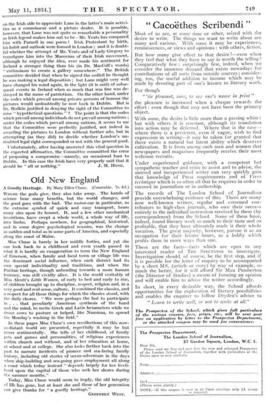Old New England
A Goodly Heritage. By Mary Ellen Chase. (Constable. 7s. 641.)
WHERE the gods give, they also take away. The hands of science bear many benefits, but the world changes, and the good goes with the bad. The motor-car in particular, as the extreme symbol of quick and easy transport, bears many sins upon its bonnet. It, and a few other mechanical inventions, have swept a whole world, a whole way of life, into limbo. Perhaps nowhere, for geographical, historical, and in some degree psychological reasons, was the change so sudden and total as in some parts of America, and especially along the coast of Maine.
Miss Chase is barely in her middle forties, and yet she can look back to a childhood and even youth passed in what it is hardly an exaggeration to term the New England of Emerson, when family and local town or village life was the dominant social influence, when each district had its own special individuality and traditions, and when the Puritan heritage, though unbending towards a more human leniency, was still vividly alive. It is the world veritably of Miss Alcott's Little Women, of early to bed and early to rise, of children brought up to discipline, respect, religion and, in a very good and real sense, culture. It combined the classics, and a respect for all those things for which the classics stood, with the daily chores. " We were perhaps the last to participate in . . that peculiarly American synthesis of the hand and the mind, to recite Greek and Latin hexameters while we drove cows to pasture or helped, like Nausicaa, to spread the Monday's washing in the field."
In these pages Miss Chase's own recollections of this now- so-distant world are presented, regretfully it may be but never sentimentally. She tells of her childhood, of family pets and games and personalities, of religious experiences within church and without, and of her education at home, at school and at college. She also looks farther back into the past to narrate incidents of pioneer and sea-faring family history, including old stories of ocean-adventUre in the days when ship-building and sea-going gave employment all along a coast which today instead " depends largely for her liveli- hood upon the capital of those who seek her shores during the summer months."
Today, Miss Chase would seem to imply, the old integrity of life has gone, but at least she and those of her generation can give thanks for " a goodly heritage."
GEOFFREY WEST.








































 Previous page
Previous page